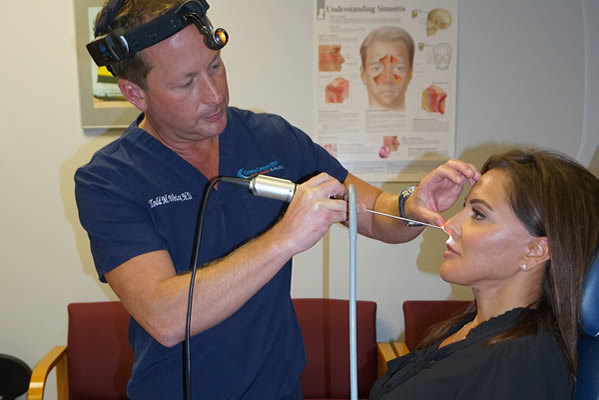
Nasal Polypectomy in Corpus Christi, TX
Do Nasal Polyps Need to Be Removed?
Polyps are growths that occur in various parts of the body, including the colon, ear canal, stomach, and nose. Even though most polyps are benign, they are still carefully monitored and usually removed since any type of abnormal cell growth can eventually lead to cancer. Polyps can also cause difficulty when breathing, chronic stuffiness, postnasal drip, and even pain your face and teeth. So even in cases where the polyp isn’t malignant, you may want to remove them for quality of life issues.
What Is a Nasal Polypectomy?

How Are Nasal Polyps Removed During Surgery?
This procedure is performed with the patient asleep (general anesthesia). A CT scan of the sinuses provides a road map for the surgery. Small endoscopes are gently inserted through the nostrils to illuminate and magnify the nasal and sinus cavities on a video monitor. The surgeon uses delicate, angled and curved instruments to open or dilate the sinus drainage pathways. Irreversibly diseased tissue and obstructing bone fragments can be carefully removed with the instruments under magnification. The most important principle in endoscopic sinus surgery is to preserve as much normal tissue as possible, allowing the sinuses to recover normal function.
If infected sinus cavities are encountered, they can be drained and washed out with sterile saltwater or antibiotic solution during the procedure. Polyps, malignant and benign tumors, fungus balls, and stagnant mucous buildups can also be removed.
Endoscopic surgery can also be utilized to correct a deviated septum, reduce enlarged turbinate tissue, remove overgrown adenoid tissue, relieve compression of the optic nerve and eye, repair cerebrospinal fluid leaks, and reconstruct defects in the wall between the brain and sinuses.
Endoscopic sinus surgery is often used to treat polyps. Dr. Weiss routinely performs this surgery in an outpatient setting. Sometimes, polyps come back, even after surgery. Ongoing medical management is required to prevent their reoccurrence.

Our In-Office Sinus Procedures Use Conscious Sedation Anesthesia
Conscious sedation anesthesia is provided through an IV by a board certified Anesthesiologist from Gulf Shore Anesthesia Associates. This allows you to have the procedure performed without you feeling any discomfort. For conscious sedation anesthesia no breathing tube or airway equipment is required. This is safer than undergoing general anesthesia in an operating room. Minimal local numbing medicine is still applied during the procedure to minimize any postoperative discomfort.
How Long Does It Take to Recover from a Nasal Polypectomy?
Corpus Christi ENT Sinus & Allergy
Corpus Christi, TX
5641 Esplanade Dr.
Corpus Christi, TX 78414
Call: 361-320-6130
Fax: 361-287-0101
Monday through Friday, 8am – 5pm
Affiliated with Advanced Hearing Aid & Diagnostics, LLC





Think you might have nasal polyps? Call Us